A New Appraisal of Final Fantasy VII
Final Fantasy VII isn't done showing us why it's so great
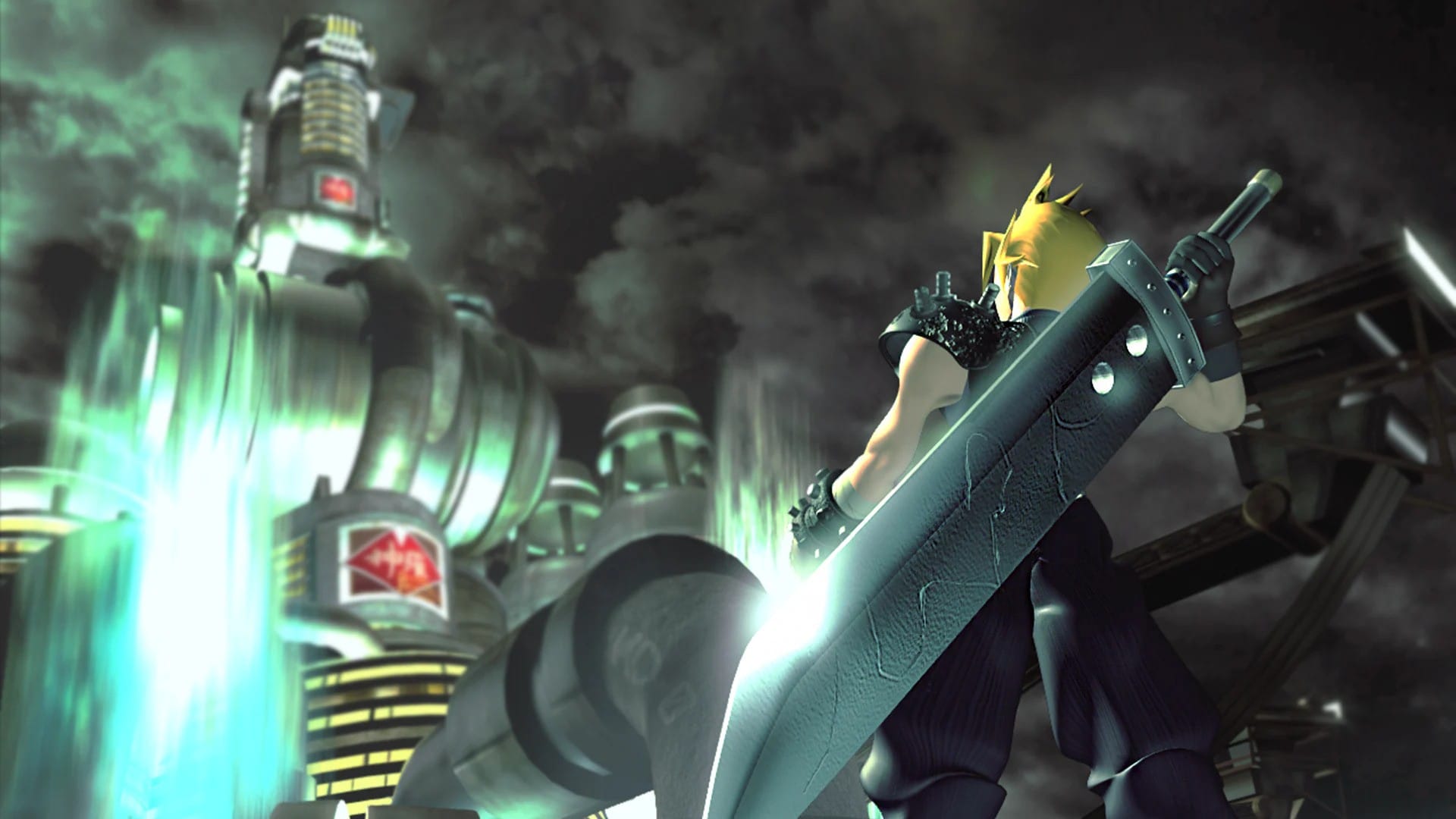
I first played Final Fantasy VII in 2003.
After playing Final Fantasy IV, V, VI, VIII, IX, and X, I was coming into my own as a series fanatic and RPG connoisseur. I'd known about Final Fantasy VII's infamy, and with Advent Children's future release date of 2005, it was a good time to be a fan. I played Dirge of Cerberus and Crisis Core, becoming embedded in Midgar and its environs. While not my favorite of the series, Final Fantasy VII was something special. Mere proximity to the game embodied a certain terroir of feelings and emotions that I could share with friends, and we relished in the camaraderie of enjoyment.
Fast forward twenty years into the future, and Final Fantasy VII retains its celebrated status as a genre-defining, world-changing entry in one of the most beloved video game franchises of all time. After a Remake, a mobile game, and countless supplementary and ancillary materials, Final Fantasy VII has become its own mini-franchise, its world exploding into permutations and interpretations.
And none of it feels like the original.

Final Fantasy VII is good
This isn't novel. Of course Final Fantasy VII is good—27 years after its initial release it is still enjoyed, celebrated, and recommended. It is considered a masterpiece, a cornerstone of the Final Fantasy series that (alongside Final Fantasy Tactics) represented the series at The Art of Video Games exhibit in the Smithsonian in 2012.
As with all things, Final Fantasy VII's fanbase, word-of-mouth praise, and critical pedestal have elevated the game to stratospheric infamy. Many people know about Final Fantasy VII, and many more have played it—the Final Fantasy VII Remake is extremely popular, and fans and newcomers are counting down the days until Rebirth. But stripped of its pomp and infamy, what is Final Fantasy VII? In 2024 does it materially retain its status as one of the greatest JRPGs of all time? Does it deserve its placement in the upper echelons of the Final Fantasy ranking?
The answer is yes, absolutely, but playing Final Fantasy VII now requires a combination of appreciation and understanding. I won't beleaguer its graphics or disparage Remake to make any sort of convoluted point about the supremacy of older video games. Instead, Final Fantasy VII deserves to be enjoyed on its merits, devoid of everything that came after. As a standalone experience, as the seventh entry in the disconnected Final Fantasy canon, it is a towering piece of media. Like the clash of Meteor and Holy, Final Fantasy VII's terminal point is the fusion of all its disparate and strange elements, a ripe experiment in the late 90s when the genre, and industry, were in flux. This results in an emotionally rich narrative, a striking world, and an unforgettable adventure.
Replaying it so many years later, it's impossible to not praise the game's elegance, to consider it a uniquely ambitious and creative RPG in a series replete with transcendent experiences.
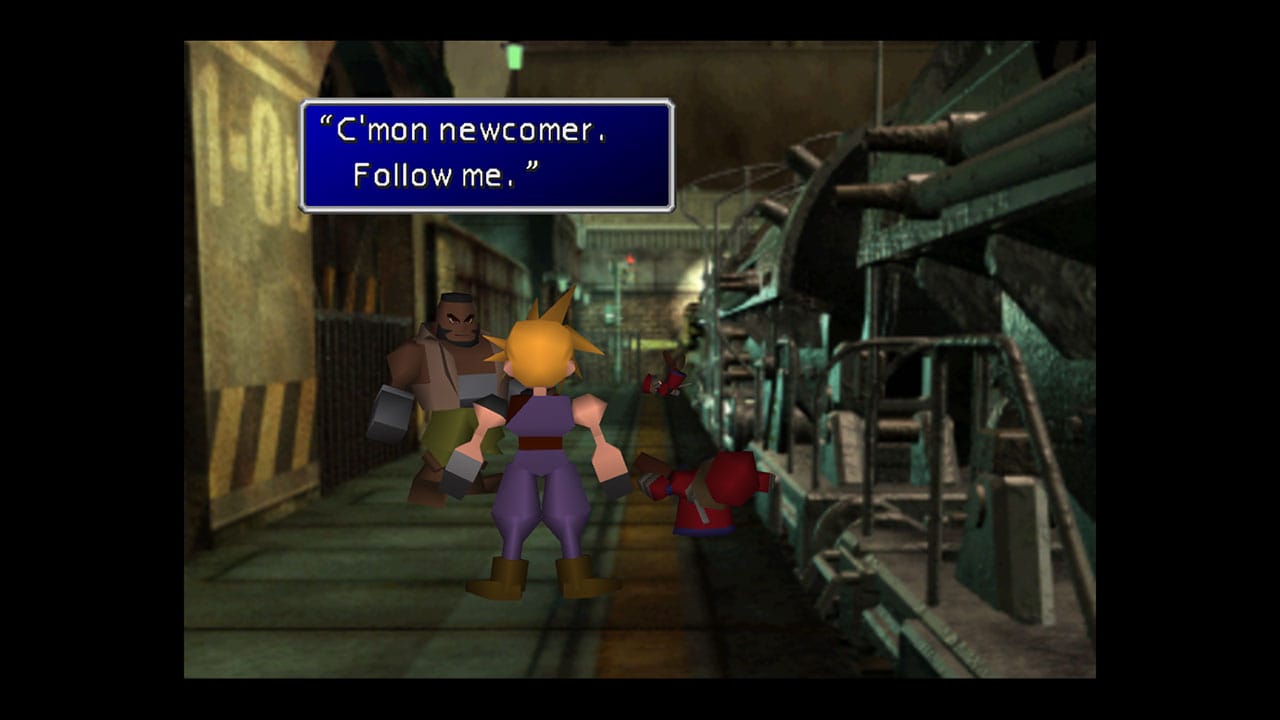
Stuck in the Lifestream
I started a fresh file on Final Fantasy VII last year, on my Switch, playing the subpar port complete with muddy pre-rendered backgrounds and fuzzy textures. These newer versions come with a couple of helpful additions: the ability to fast forward in any RPG is a godsend, especially in those I've played before, not to mention the ability to turn off random encounters at will. After playing it many times before, I decided to scrutinize the many small moments that honeycomb Final Fantasy VII's story, to consider its richness of character and pacing.
The opening hours of Final Fantasy VII are rather infamous—the entire Midgar section is now a 40-hour JRPG called Final Fantasy VII Remake, the iconography is heavily used in Advent Children, and if you've picked up and put down FFVII any number of times over the years you've no doubt spent more time in Midgar than you meant to. While these seminal events are especially hard-hitting, they encompass such a small portion of the overall game.
Final Fantasy VII expertly splits its narrative into fronts. The first and most obvious is the existential crisis of Cloud Strife. His identity plays a key role throughout the game, and he remains an unreliable narrator for himself and his friends up until the end. If you only know Cloud from AC and Remake, you might not be familiar with the goofy, uneven, awkward character that he is in the original. Lines like "let's mosey" have been memed to death, but on this playthrough, I was struck by just how poorly modern presentations of Cloud have interpreted his character. The party regularly makes concessions for his episodes, with Barrett casting plenty of doubt on his competency even in the game's later hours. Cloud's entire being is propped up by those around him, chiefly Aerith and Tifa (I can't help but wonder how the upcoming Final Fantasy VII games are going to handle a certain scene at the Temple of the Ancients.)
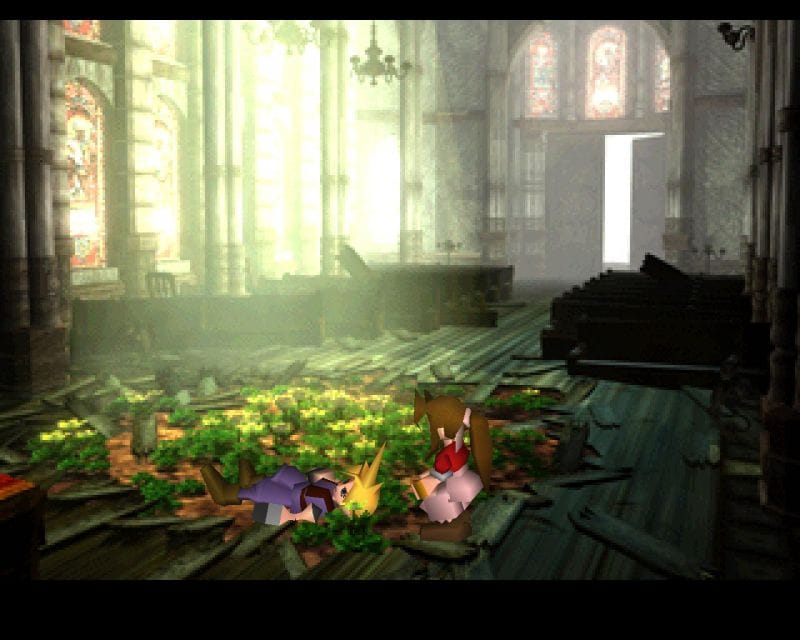
As with all things, Final Fantasy VII's fanbase, word-of-mouth praise, and critical pedestal have elevated the game to stratospheric infamy.
Characterizations in Final Fantasy VII are striking—the game features one of the most robust arrays of characters in the entire series, and the narrative goes to great lengths to make Cloud, Zack, Aerith, and the others shine with personality sans voice acting. While certain events important to the future of Final Fantasy VII are surprisingly optional within the original, the plot regularly rewards curious players. Final Fantasy VII's identity, even when compared to other Final Fantasy titles before and after, is marked by its unique strangeness. This play through, I was struck by how unconcerned Final Fantasy VII is with traditional narrative devices, and how it's all the stronger for it.
Into the Lifestream
It's easy to take Final Fantasy VII's story and themes for granted, especially when it's been nearly thirty years since its initial release. Eco-terrorism and evil corporations are nothing new, but Final Fantasy VII crystallized a type of storytelling that had floundered for years, segmenting its silliness with moments of true narrative drama. While Final Fantasy VI deserves infinite praise for elevating the series' tone, VII impressed a generation with an unpolished localization and unconventional design. It's easy enough to dismiss the many mistakes throughout the game's script, but the core storytelling elements, not to mention the bold cinematographic direction, created something that no one had seen before.
Compared to Final Fantasy VIII only a year later, VII shows its age. The game was only a few years old by the time Final Fantasy X was on the market—it existed before the iteration of Fira and Firaga, before vocal musical themes, before voice acting, and before quality localizations. Pre-rendered cutscenes might seem passe now—a design necessity of yesteryear now disparaged—but they do add a lost artistic element. Final Fantasy VII's areas are so vastly diverse, oscillating between bird's-eye cities, two-dimensional bridges, and brilliantly kaleidoscopic caverns, they drench the game in an aesthetic specificity.
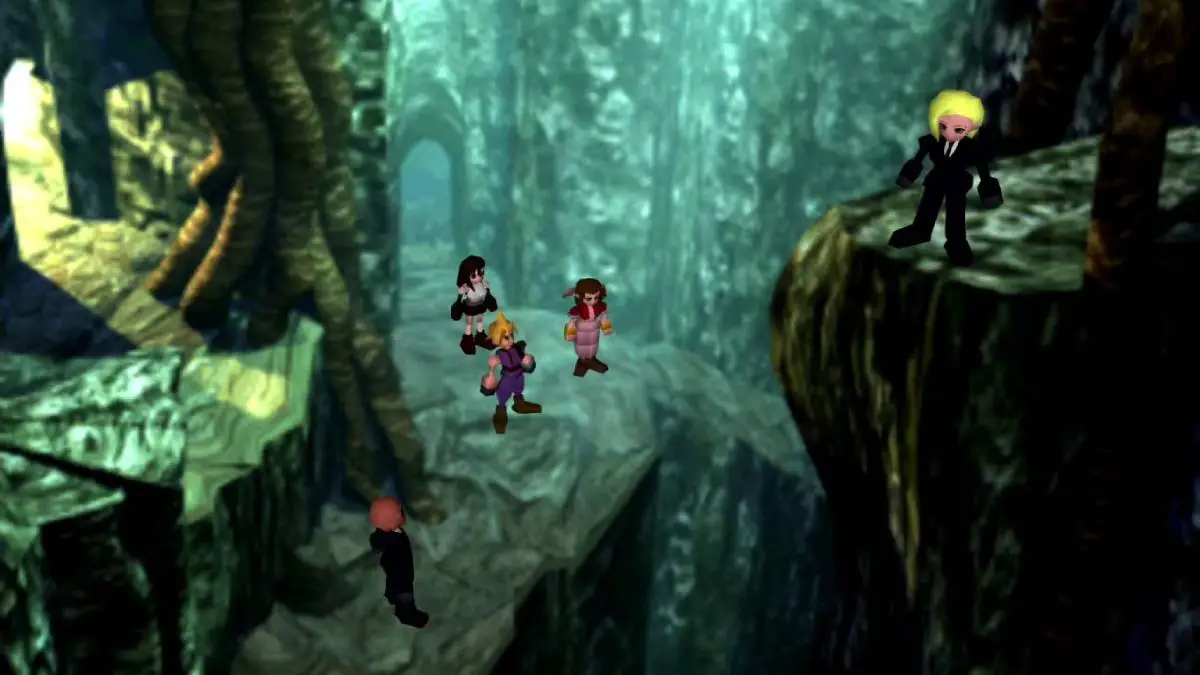
Final Fantasy VII crystallized a type of storytelling that had floundered for years, segmenting its silliness with moments of true narrative drama.
When discussing why exactly Final Fantasy VII is so good all these years later, you examine its elements: characters, gameplay, story, soundtrack. It was the first RPG for many, the first major JRPG in the West, and the first big Final Fantasy to catch on with a mainstream crowd. New fans might be hesitant to try it regardless of its pedigree because of its older design, graphics, and presentation—but great art is truly ageless. Final Fantasy VII is as cosmic and grand, intimate and dramatic, romantic and horrifying. It's a game that reaches for the stars and drudges beneath the planet, a title so ambitious it's as if Square was once again throwing everything it could at the title, hoping this hodgepodge of ideas might coalesce into something eternal.
"I'll come back when this is all over."
During this revisit of Final Fantasy VII, what truly impressed me was the second disc. The events of the first are memorable and infamous: the Midgar escape, the Kalm flashback, and Aerith's death. Up until that point, it's as if Final Fantasy VII was content on being an amalgamation of all that had come before, pulling from the past to make a fantastic Final Fantasy that would be enjoyed for years. But the bravery of design in the second half of the game truly cements it as one of the greatest in the series; Final Fantasy VII dutifully goes off the rails and sticks to its weirdness.
Aerith's death hits hard regardless of spoiler or preparation. There's a reason that so many fans were convinced there was a way to return her to life; she's an impactful, beloved character whose fate in Rebirth has not yet been decided. The player hardly has time to emotionally respond to this tragedy—Sephiroth impales Aerith, decimating all hope of saving the world, and another permutation of Jenova attempts to slaughter the party. No recovery can alter the fact that from this point onward, everything is different: Aerith is gone, and it's not a joke or an illusion. Even though plenty of RPGs have killed off characters, Aerith's is particularly surprising and devastating because there is simply no expectation for it. The narrative expertly centers her as the most important character in the game, a valuable Ancient that will herald us into the Promised Land and save the planet.
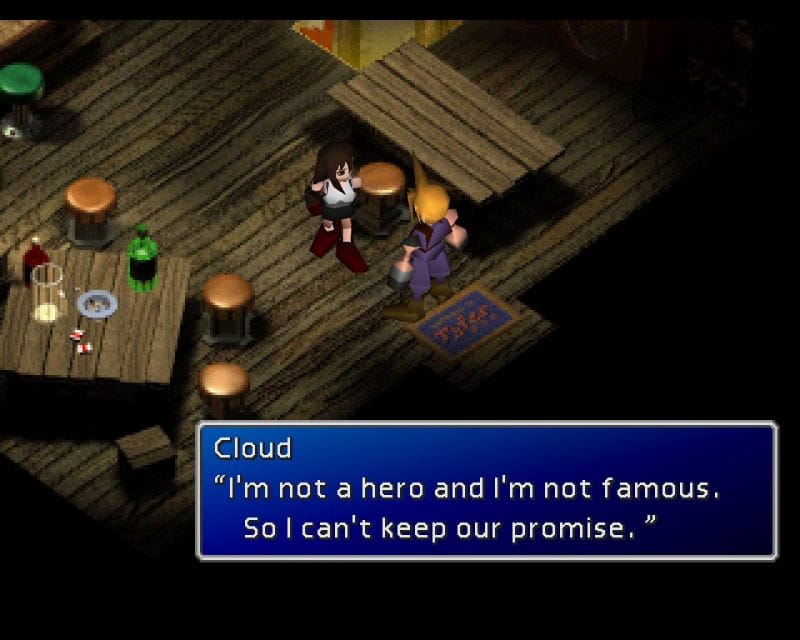
After Aerith's death, Final Fantasy VII becomes something else. Cloud succumbs to his madness, the lies of his past a debilitation that sinks him and Tifa into a subconscious lifestream. While plenty of Final Fantasy titles before and after centered on the psychology of their protagonist, Cloud's break is particularly twisted—multiple people in his life, chiefly Tifa, knew that he was lying at best and psychotic at worst. Cloud transforms before our eyes from badass SOLDIER to brittle husk, and even when he pulls himself out of it, the person we know is gone.
Cloud isn't the only one whose ennui dramatically affects the game's latter half. It's as if Aerith's death unraveled all of reality and sent each character rocketing toward alternate destinies. It is also here that Final Fantasy VII becomes much stranger: the Huge Materia events, Cloud-less moments, and breakdown of Shinra, not to mention the appearance of the Weapons and the discovery of the "real" Sephiroth all smash together like disparate events careening toward a plot desperate to find its sense of direction. The terror continually amps up as Jenova and Sephiroth wreak havoc upon the planet.
Aerith was the game's pin, and once gone, the player is forced to reconcile with the fact that the future itself is no longer a map on the wall. The game drives us toward melancholy even as the final minutes peter out: the sky blazes, Meteor falls, and the planet utilizes the strength of Holy to eke out some kind of salvation. We never find the Promised Land, we beat Jenova by the skin of our teeth, and we don't know what portion of the population survives. Five hundred years later, an aged Nanaki returns to Midgar with his brood, the landscape fundamentally changed in an age healed from the terrors of industry. It's an ending so open-ended and so tragically dynamic that the mere existence of secondary Final Fantasy VII media lessens its impact.
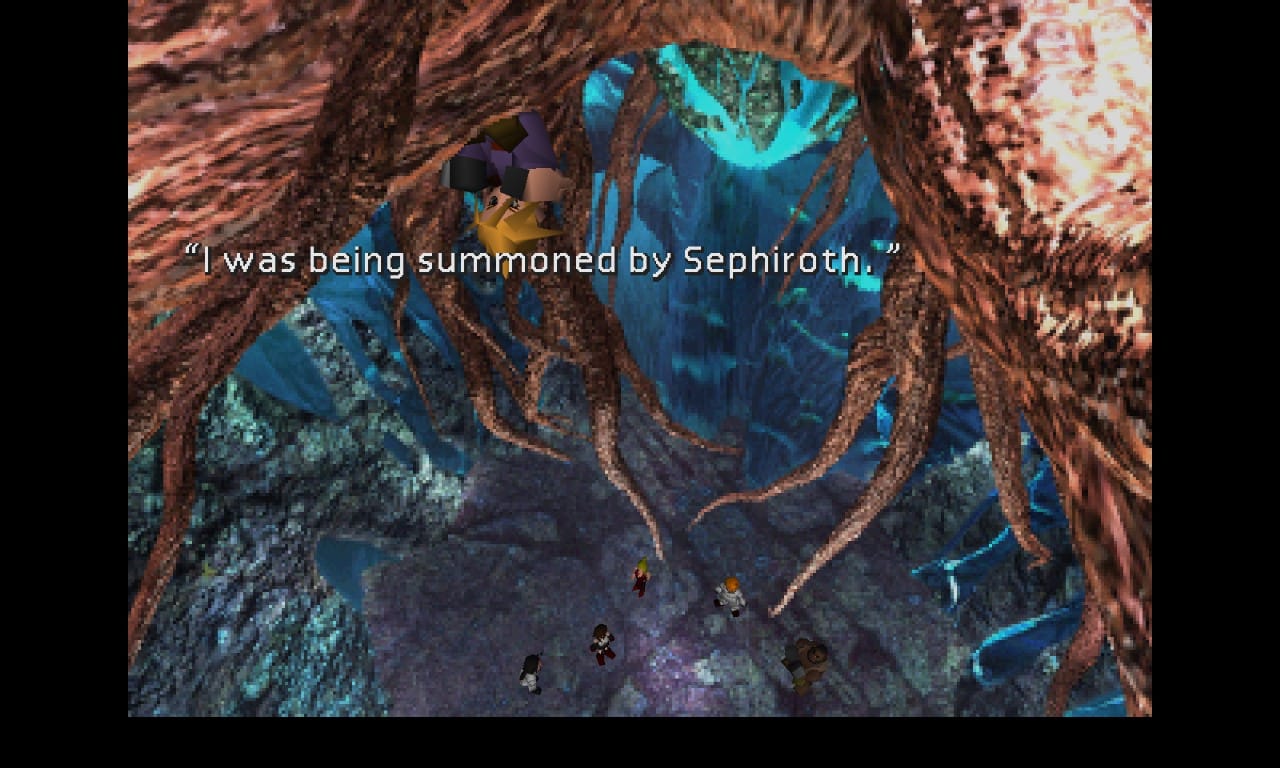
Memory and reality
Too often we allow our memories of art to linger in place of deserved refreshers. Re-examinations of fiction and media are paramount to a robust and artful understanding, and in the case of video games, it's far too easy to play something once and believe that your interpretation or recollection is sacrosanct. Even though I've played Final Fantasy VII a few times before, my mind is like Cloud's, endlessly tricking me into assured beliefs that are impossible illusions.
What most impressed me about this run through Final Fantasy VII was how often I paused to appreciate particularly grand moments. Central to its strangeness, its creativity, and its character-forward plot, Final Fantasy VII stands as a titanic RPG, and no amount of revisionist history can lessen it.
I can't help but want to protect the original game because of all its flaws and imperfections. The older I get, the more I realize that flaws are what identify a work of art. Flaws are what make a thing endearing—they are our memes, our identifiers, our iconography. Final Fantasy VII's best features are the aspects that make it strange, that truly allow it to stand out in a series of XVI mainline entries. The conversation around individual games is mired in its subjective opinions, but Final Fantasy VII deserves more than its place as the definitive Final Fantasy—it should be celebrated for the incredible game that it is.
